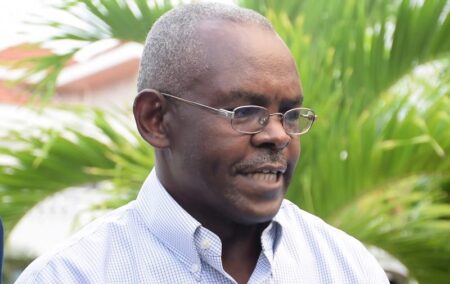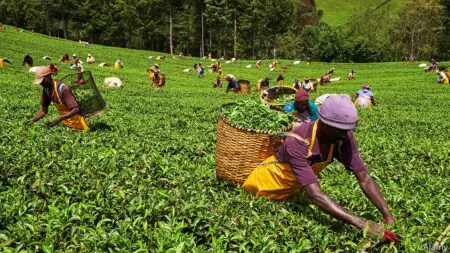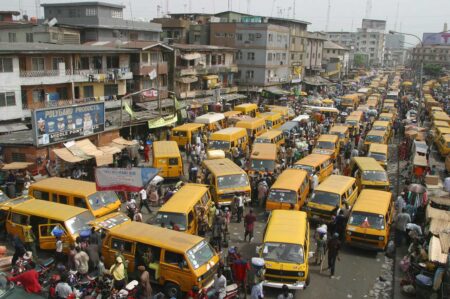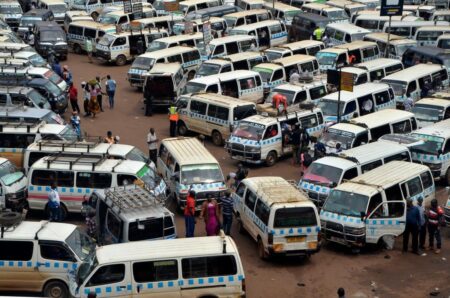- Africa’s new dawn: the rising role of digital and AI in agriculture
- Can Dangote Refinery Transform Africa Energy Ambition
- Gallup Survey: 80 per cent of Kenyan Workers Are Disengaged and Seek New Opportunities
- Madagascar Man Freed from 5KG Tumor After 15-Year Struggle
- How women in Africa are perceived and treated
- Sugar consumption in Kenya to Increase to 1.23 Million Tonnes
- Can Somalia and Turkey Oil deal Bring Change in Somaliland
- Remittances to Kenya dropped to $371.6 million in June, marking a six month low
Browsing: East Africa
- Dr Kamau Thugge, who is President Ruto’s advisor on fiscal affairs, is set to take over from Dr Patrick Njoroge.
- Previously, Dr Thugge served as the Permanent Secretary at Kenya’s National Treasury between 2013 and 2019.
- Prior to his nomination as Principal Secretary, he worked as a senior economic adviser in the Ministry of Finance since 2010.
President William Ruto has nominated former IMF economist Dr Kamau Thugge for appointment to head the Central Bank of Kenya. Dr Ruto picked Dr Thugge out of a list of six candidates who were interviewed on May 9th for the job that helps define Kenya’s fiscal policy.
Dr Thugge is not a stranger at Kenya’s financial industry. For close to 10 years, between 2013 and 2019, he served as the Principal Secretary, National Treasury under former President Uhuru Kenyatta. He was, however, hounded out of office over allegations of corruption. The scandal, which …
- Across the East Africa region, Rwanda posted the strongest performance.
- Uganda’s economy grew by 4.4 percent in 2022 compared to a 6.7 percent uptick in 2021.
- Tanzania’s real GDP expanded by 4.5 percent in 2022 compared to 4.9 percent growth in 2021.
Kenya’s economy recorded a slower growth of 4.8 percent last year as agriculture slumped due to severe drought. In 2021, Kenya posted 7.6 percent growth as the country emerged from Covid-19 induced economic fallout.
Latest data from the Kenya National Bureau of Statistics show that East Africa’s economic powerhouse growth outpaced its neighbours. Kenya saw its nominal GDP increase to $98.24 billion, from $87.98 billion in 2021, retaining its pole position over East African peers.
Uganda’s economy grew by 4.4 percent in 2022 compared to a 6.7 percent growth in 2021. The marginal drop was partly on account of recovery in hospitality and other service sectors as schools …
- 20 investments in manufacturing, ICT, energy, health and agri-business have been signed in past two months.
- Latest Kenya-US trade ties place the East African country at a pole position on attracting more American dollars.
- Since President William Ruto took office in September 2022, Kenya-US engagements have been on a full throttle.
Deepening Kenya-US trade ties have started to pay dividends as American firms move to invest in East Africa’s largest economy. With modern infrastructure, and skilled labour force, Kenya offers one of the best opportunities for US investors eyeing the region.
Currently, Kenya is the second most preferred destination by Americans seeking to invest in Africa. The 2023 US government review shows Kenya hosts 142 American firms while Nigeria has 195 conglomerates.
Latest developments, however, place Kenya at a pole position in attracting more American investors in the short to medium-term.
Deepening Kenya-US bilateral ties
Since President William Ruto took …
- In a fresh strategy, Kenya Tourism Board (KTB) says arrivals from China hold massive potential in contributing to the country’s tourism earnings.
- China accounted for 82,180 and 83,388 arrivals in 2018 and 2019 respectively positioning itself as Kenya’s sixth largest source market.
- Before the pandemic, China was the world’s largest outbound travel market with over 150 million travelers, whose spending contributed up to $255 billion to global tourism industry.
The Kenya Tourism Board (KTB) is looking to capitalize on outdoor and nature-based tourism experiences, a move aimed at attracting a significant number of Chinese tourists to sample the sector’s offerings in East Africa’s largest economy.
KTB Chairperson Francis Gichaba says the initiative is part of the state agency’s efforts to shore up tourism numbers from the growing Chinese market even as the industry recovers from Covid-19 pandemic-induced hit.
Mr Gichaba said the new strategy is aimed at increasing arrivals from …
- In East Africa, cargo transportation costs are exorbitant, ranking among the highest globally
- High logistics costs translate to expensive basic commodities like food across the continent
- Tech startups are collaborating with various stakeholders to enhance infrastructure and simplify trade, manufacturing, and logistics processes
In East Africa, cargo transportation costs are exorbitant, ranking among the highest globally. A Shippers Council of East Africa (SCEA) survey in 2021 revealed that transporters who use the Northern Corridor, a trucking route serving countries like Kenya, Uganda, Rwanda, Burundi, the DRC, and South Sudan, incur an estimated cost of $1.8 per km per container.
This figure is almost double the global average of $1 per km per container, making logistics complex and expensive for African businesses. The situation has been worsened by the current record-high fuel prices in Kenya, Uganda, and other East African countries.
To add to this, poor infrastructure in several parts of …
- The country is considered East Africa’s strongest economy.
- It is among countries facing a huge challenge of illicit trade, estimated to be valued at above USD6.34 billion (Ksh800 billion).
- According to official government data, up to 70% of imported goods are counterfeits.
Kenya has a domestic market of over 50 million people and is among the leading economies in sub-Saharan Africa.
The country is considered East Africa’s strongest economy, with the region having a GDP of about USD163.4 billion (at purchasing power parity, about USD$473 billion), and the average GDP per capita is about USD941 (at purchasing power parity, $2,722).
In addition to the EAC market, investors in the partner States have access to other African markets such as COMESA, SADC and AfCFTA, as well as international markets through preferential trade arrangements.
The Common Market for Eastern and Southern Africa (COMESA) comprises 21 Member States with a population of 560 …
- East Africa is anticipated to have the highest performance, surpassing other regions.
- Central Africa is projected to experience growth of 4.7% in 2022, up from 3.6% in 2021.
- West Africa’s growth fell to 3.6% in 2022, down from 4.4% in 2021. In the medium term, it is anticipated to increase, hitting 4.1% in 2023.
- In 2022, growth in Southern Africa is projected to continue modest, falling to 2.5% from 4.3% in 2021.
The slowing of Africa’s average growth conceals cross-regional variances, which primarily reflect disparities in the structure of economies, commodity dependency, differential impact of global exogenous shocks, and domestic policy responses to buffer the impact of these shocks.
According to the new biannual publication of the African Development Bank Group, Africa’s Macroeconomic Performance and Forecast, East Africa is anticipated to have the highest performance, surpassing other regions.
This, as economies in the region continue to implement post-Covid-19 epidemic recovery …
- In Kenya, the airline is projected to register 19% more seats than in 2022.
- The expected growth is attributed to increased business travel post the August 2022 general elections.
- New Regional General Manager exhibits confidence in Nairobi’s ability to support Air France-KLM operations by providing a stable and developing business climate and regional connectivity.
Air France KLM Group is keen to solidify its position in the East African market and meet the fast- changing consumer needs, as it embarks on its 2023 growth plan.
This comes after a challenging Covid-19 pandemic season that saw air travel falling sharply prompting airlines to cut capacity.
The new Air France – KLM General Manager, East and Southern Africa, Nigeria, and Ghana, based in Nairobi Marius van der Ham said: “For 2023, we aim to capitalize on the gains made in 2022 to further solidify our position in the East Africa market. This …
- The market is currently dominated by Isuzu and Toyota.
- Majority of Kenyans prefer cheaper second-hand cars imported mainly from Japan.
- The new Landtrek enables Peugeot to make a comeback in a pick-up market where it has a strong heritage, including legendary models such as 404 wagon and the 504 pick-up, which won the 1984 African Rally championships.
Peugeot is seeking to grow its sales in Kenya as it moves to introduce a new pick-up truck in the market that has been dominated by Isuzu and Toyota in recent years. The French automaker has launched its latest pick-up truck, the Peugeot Landtrek, in the country.
The vehicle is set to make a bold statement in the one-ton pick-up segment seeing as its built to meet the demands of vibrant pickup markets across the continent.
The Peugeot Landtrek is suitable for both professional and family needs. The vehicle is fitted with the …
Uganda Bureau of Statistics has indicated that the country’s inflation has for the first time since 2012 hit double digits, rising to 10 per cent in September 2022 from 2.7 per cent in January 2022 and 4.9 per cent in April 2022.
It is said that inflation above an annual average of 5 per cent retards economic growth and derails economic development.
According to an article titled Uganda grapples with soaring inflation amid persistent global uncertainties, the rise in inflation has been brought about by issues such as tightening of global financial conditions, which triggered investors’ exit from the domestic debt market, thus stoking depreciation pressures on the Uganda Shilling; the Russia-Ukraine conflict, which disrupted global production and supply chains; extended drought in some regions of the country; and increased global commodity prices.…














